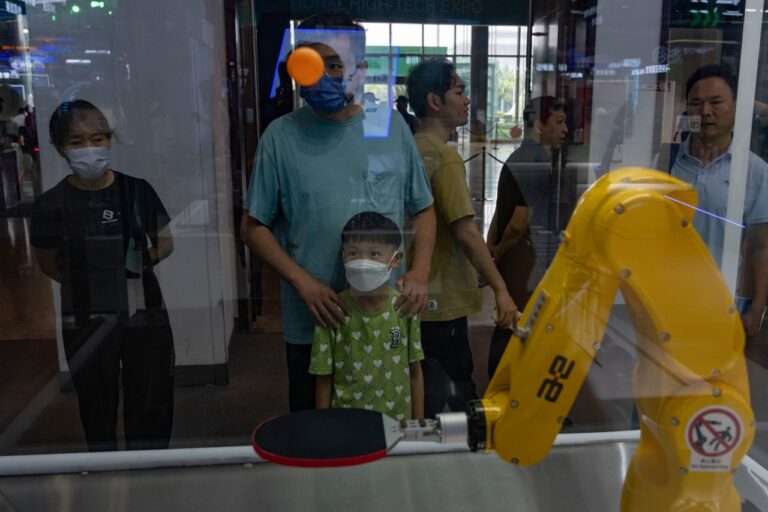
Visitors watch a robotic arm play table tennis at the China Beijing Hi-Tech Expo in Beijing, Tuesday, July 16, 2024. (AP Photo/Ng Han Guang)
BEIJING (AP) — China’s Communist Party is wrapping up a top-level meeting Thursday that is expected to approve policies aimed at improving the country’s technological capabilities and bolstering national security.
The meeting was held behind closed doors, but analysts expect a major focus will be on strategies for self-reliant economic growth at a time when China faces tightening restrictions on access to advanced Western technologies, including cutting-edge computer chips and artificial intelligence.
Foreign investors and markets were focused on what measures the ruling Communist Party would take to counter a slump in China’s property sector and weak consumer confidence that is hampering the country’s recovery from the COVID-19 pandemic.
Economic growth slowed to 4.7 percent year-on-year in the April-June quarter as property investment and sales continued to decline despite a series of measures aimed at encouraging home buying.
Recent state media reports and previous government policy statements suggest that Beijing will continue to prioritize investment in technology and encourage companies to improve their equipment and know-how, in line with President Xi Jinping’s call for “high-quality development”.
“President Xi’s recent remarks on reform and opening up at various major conferences provide important clues to the atmosphere of the meetings, the priorities of China’s reform tasks and the overall goal of further deepening reform and advancing China’s modernization,” the party’s official newspaper, the Global Times, said in an editorial.
He said the conference would “outline a blueprint for reform in all respects” and seek to improve China’s governance and “resolve deep-rooted institutional challenges and structural problems, promote high-quality development and advance China’s modernization.”
China’s leaders have repeatedly said China will remain open to foreign investment and improve its business environment, despite the Communist Party’s ever-tightening control over companies, social media, financial regulators and other aspects of life.
“This runs counter to previous promises and reform commitments of further opening up the economy and more market-friendly policies,” Theuwe Mevissen, senior strategist at Rabobank, said in a report.
He said new incentives for foreign investors and moves in line with Xi’s call for “shared prosperity” to ensure ordinary Chinese people benefit more from economic growth were also possible.
Another priority is easing the financial strain on local governments, who are burdened with huge debts after a crackdown on heavy borrowing by property developers plunged the property sector into crisis and cut off a key source of tax revenue from the sale of land-use rights.
This week’s meeting marks the third plenary session of the 205-member Party Central Committee, which begins a five-year term in 2022. The third plenary session, postponed from last year, typically sees major economic policy decisions made. Past landmark plenary sessions helped spark China’s emergence as a global manufacturing and financial powerhouse during the “reform and opening up” era.
Economists say the meeting is unlikely to see the announcement of any major stimulus measures to stimulate the economy, and details of any decisions may be announced in the coming days rather than after the party’s powerful Politburo meets later this month.
But the scale of the problem facing Beijing makes it more urgent to act.
“Historically, the Third Plenum has often been a disappointment when it comes to announcing major policy reforms, but this time things may be different given China’s growing economic challenges,” Mevissen said.
___
Kurtenbach reported from Bangkok

